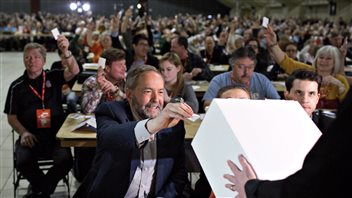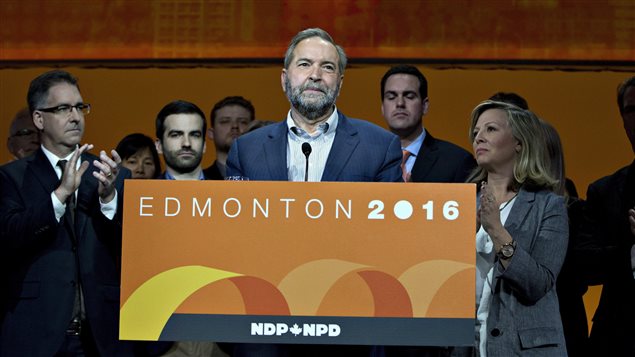The New Democratic Party voted to change leaders during a divisive policy convention on the weekend of April 9-10, 2016. The NDP is the farthest left of Canada’s major political parties, although a leading political scientist says that, by international standards, it is more of a centrist party and not a hard-core socialist or communist party.
The NDP has never won enough seats to form a national government. But under the leadership of the late Jack Layton, the party made huge gains in popularity and finally became the official opposition in the election of May 2, 2011. Layton died in August of that same year.

High expectations dashed
Tom Mulcair was chosen to lead the party and was notable as a fierce debater in the House of Commons. During the election campaign leading up to the October 15, 2015 election, members of the NDP thought they had a chance at winning the election.
Instead, the NDP suffered huge losses, as the Liberal Party with its charismatic leader, Justin Trudeau, swept the election winning 184 of the country’s 338 seats. The NDP went from having 103 seats before the 2015 election to winning only 44.
A ‘huge’ loss
“The election loss was huge because they actually…if you ask me, I thought they were in dreamland…but they thought they had a chance at becoming the government, which they had never been before,” says Laure Paquette, an associate professor of political science at Lakehead University in Ontario.
“I didn’t think they had a chance, but they did. So, they were particularly crushed. And they lost the money that comes with being the official opposition. So now they’re poor and they have a leader who had a bad idea to win the next election, and lost them more seats.”
ListenThe bad idea Mulcair had was to promise to not run a deficit. The idea was to try to assuage the fears of Canadians who might be afraid the NDP would spend too much money on social programs and other left-leaning goals if the party were voted into office.The Liberal leader seized the moment and vowed to spur the economy by spending money on infrastructure and running a modest deficit. It was one of many strategies believed to have contributed to the Liberals’ massive win.

Right turn, left turn
Mulcair was roundly criticized for the loss, but may have compounded his problem with a more recent strategy, says Paquette. “To my mind he made the same mistake twice. During that famous election campaign that went so badly, he tried to move the party to the right against the wishes of the grassroots in order to try and win and, of course, didn’t.
“And then, in order to keep his job, he tried moving himself to the left. There was something called the Leap Manifesto—a collection of policy positions that was being discussed and debated at the convention—and he decided to support it, even though he had moved the party to the right during the election and lost.”
A ‘humiliating’ defeat
Although the NDP has a history of giving its leaders a second chance, this was not the case with Mulcair. Delegates to the convention voted by 52 per cent to replace him with a new leader. That was far from the ideal 70 per cent it would have taken to prove he had the confidence of the party. Paquette calls it a humiliating defeat for Mulcair.
Big challenges ahead
As for where the party goes from here: “Goodness only knows because it’s going to be a tough job,” she says. Mulcair will stay on for two years while the party searches for a new leader. Paquette says there are many challenges for the NDP.
For one, the party has trouble raising money, but badly needs it to modernize its data base.
Division over oil
Then, there was deeply division at the convention over the issue of oil pipelines. Delegates from the oil-producing province of Alberta want them, while delegates worried about climate change say oil should stay in the ground.
‘A tall order’
Canada is an officially bilingual country and most people in the province of Quebec are French speakers. That province has many seats and it is believed that in order to win a federal election, a party must capture many seats there. In Paquette’s view, finding a new leader who speaks both English and French to appeal to the whole country will be “a tall order.”







For reasons beyond our control, and for an undetermined period of time, our comment section is now closed. However, our social networks remain open to your contributions.